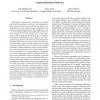Free Online Productivity Tools
i2Speak
i2Symbol
i2OCR
iTex2Img
iWeb2Print
iWeb2Shot
i2Type
iPdf2Split
iPdf2Merge
i2Bopomofo
i2Arabic
i2Style
i2Image
i2PDF
iLatex2Rtf
Sci2ools
126
click to vote
NDSS
2008
IEEE
2008
IEEE
Analysis-Resistant Malware
Traditionally, techniques for computing on encrypted data have been proposed with privacy preserving applications in mind. Several current cryptosystems support a homomorphic operation, allowing simple computations to be performed using encrypted values. This is sufficient to realize several useful applications, including schemes for electronic voting [16, 12, 17] and single server private information retrieval (PIR) [19, 9]. In this paper, we introduce an alternative application for these techniques in an unexpected setting: malware. We point out the counterintuitive possibility of malware which renders some aspects of its behavior provably resistant to forensic analysis, even with full control over the malware code, its input, and its execution environment. While methods for general purpose computation on encrypted data have not yet been realized, we explore the potential use of current techniques. Specifically, we consider in depth the possibility of malware which employs private...
| Added | 01 Jun 2010 |
| Updated | 01 Jun 2010 |
| Type | Conference |
| Year | 2008 |
| Where | NDSS |
| Authors | John Bethencourt, Dawn Song, Brent Waters |
Comments (0)

